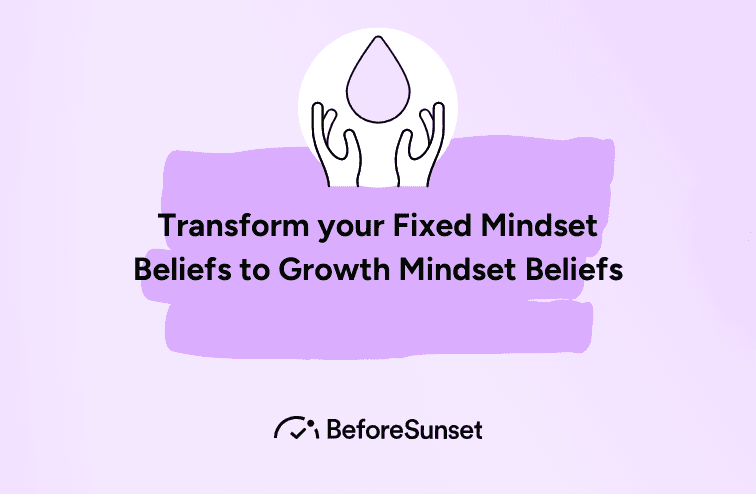American psychologist Carol Dweck argues that it's not just intelligence, talent, or education that distinguishes successful individuals.
Rather, it's their mindset or their approach to life's hurdles. Dweck introduces the concept of mindset, highlighting how a "fixed mindset" can impede progress, while a "growth mindset" can propel one toward achieving aspirations.
Dweck's research illuminates the profound influence of our fundamental beliefs, whether they reside in our conscious or subconscious mind. These beliefs wield significant influence over our desires and our ability to achieve them.
Our "mindset" shapes much of our self-perception, driving us forward toward our goals or serving as a barrier to realizing our full potential. It is both the engine that propels us toward success and the obstacle that obstructs our path.
By understanding and harnessing the power of our mindset, we can unlock new levels of achievement and personal growth.
Dweck's findings underscore the importance of cultivating a mindset that fosters resilience, ambition, and a dedication to continuous improvement.
In doing so, we empower ourselves to transcend limitations, embrace challenges, and ultimately fulfill our aspirations.
What is a Fixed Mindset?
A fixed mindset entails the conviction that one's intelligence, talents, and other capabilities are immutable. It entails the belief that individuals are inherently endowed with specific skills and are incapable of altering them.
Fixed mindset individuals tend to avoid situations where they might fail, as they fear it may expose their perceived limitations.
They may also resist efforts to learn new skills or improve existing ones, believing that their abilities are fixed and cannot be enhanced through effort or practice.
Overall, a fixed mindset can limit personal growth and hinder individuals from reaching their full potential.
In simple logic, it is the patterns of cognition that affect us in our everyday lives, in our learning process, and at every point of our lives.
Consequences of a Fixed Mindset:
The implications of a fixed mindset can be profound and far-reaching:
Stagnation: People with a fixed mindset may find themselves stuck in a rut, unwilling to step out of their comfort zones or pursue new opportunities. And it can affect their personal development.
Limited Growth: By believing that their abilities are fixed, individuals miss out on the chance to develop new skills and reach their full potential.
Reduced Resilience: When faced with setbacks or obstacles, those with a fixed mindset may be more likely to give up, believing that they lack the inherent capability to overcome challenges and because of that they can lose their attraction to learning opportunities.
What is a Growth Mindset?
People with a growth mindset have a belief system in which individuals believe that their abilities, intelligence, and talents can be developed and cultivated through dedication, effort, and perseverance.
They embrace challenges, view failure as an opportunity for learning, and see effort as the path to mastery. Successful people are usually people with this current mindset.
Personality Traits of People with a Growth Mindset
Individuals who embrace a growth mindset in their personal lives view challenges as opportunities for personal development, rather than threats to their capabilities or self-esteem.
They understand the importance of effort in improvement, willingly investing time and energy into honing their skills. In this way, they are more likely to discover their natural talents.
When faced with barriers, they persist and adapt, seeking alternative solutions to overcome obstacles rather than giving up. Actively seeking feedback, they see constructive criticism as a valuable tool for a positive mindset.
Believing in their approach to life can continuously learn, and they understand that intelligence and abilities can be cultivated through practice. So that they find happiness in life or continue to develop in their professional life.
Instead of fixating solely on outcomes, they appreciate the learning process itself. Criticism is welcomed as an opportunity for improvement, rather than a blow to their self-worth. Accepting this kind of criticism can even bring about a huge difference in their moral life.
They celebrate not only their successes but also the effort and progress made along the way, acknowledging that growth is an ongoing journey.
10 Examples of Fixed Mindset to Growth Mindset
1) Failure in a Task:
Fixed Mindset: "I failed this task; I must not be good at it."
Growth Mindset: "I failed this task; I need to learn from it and try again."
It's easiest to give up when we've failed. But we need to think well about why we failed in this task and act accordingly. Because both internal and external factors play a role in the problems we experience.
2) Receiving Criticism:
Fixed Mindset: "I can't handle criticism; it means I'm not good enough."
Growth Mindset: "Criticism is an opportunity for me to learn and grow."
Accepting criticism brings us closer and closer to a stronger person, and if we have a cognition like this, as an alternative to looking at the criticism from a sore point of view, we can think that it is not personal and that it was said to help the situation.
3) Facing Challenges:
Fixed Mindset: "This challenge is too difficult for me; I'll never succeed."
Growth Mindset: "This challenge is an opportunity for me to stretch and improve my skills."
Challenging tasks are always difficult to start, but the feeling of progress, when we start and finish that task, will make us feel very good.
4) Comparison with Others:
Fixed Mindset: "I'll never be as good as him; they're just naturally talented."
Growth Mindset: "I can learn from his success and work on improving myself."
The most important thing we should not forget is that we all grow and develop in different conditions, so it would be very healthy to focus on the good aspects of those we see as idols and think about how we can develop if we were us, instead of comparing and lowering our self-confidence.
5) Effort and Hard Work:
Fixed Mindset: "If I have to work hard, it means I'm not smart enough."
Growth Mindset: "Effort is the path to mastery; the harder I work, the more I'll improve."
On the contrary, if this is how our learning process works, we should think about how we can be the most productive.
6) Setbacks and Obstacles:
Fixed Mindset: "Setbacks mean I should give up; it's a sign I'm not cut out for this."
Growth Mindset: "Setbacks are part of the learning process; I'll find a way to overcome them."
Each time we overcome an obstacle, we become better at the previous one. when we overcome the obstacle, it will give us a lot of strength to look back and see how much we have achieved.
7) The success of Others:
Fixed Mindset: "If someone else succeeds, it means I'll fall behind."
Growth Mindset: "Others' success motivates me to set my own goals and work towards them."
Especially seeing famous people succeed can demoralize us, but just because they can do it doesn't mean we can't do it.
8) Seeking Help:
Fixed Mindset: "Asking for help is a sign of weakness; I should figure it out on my own."
Growth Mindset: "Seeking help is a strength; it accelerates my learning and progress."
People have always lived in unity. It is therefore natural that they need each other. Asking for help is also part of the development.
9) Feedback from Others:
Fixed Mindset: "If I receive negative feedback, it means I'm not good enough."
Growth Mindset: "Feedback helps me identify areas for improvement and guides my development."
Like criticism, receiving feedback will also improve us a lot. Everyone has received feedback at every point in their lives in line with their work.
10) Having Trouble with Time Management:
Fixed Mindset: "I can never manage my time, planning is for smart people."
Growth Mindset: "Time management is a learned thing and with enough practice, I can do it"
Especially being productive and managing time mindset through helpful tools will make our lives much easier. For example with BeforeSunset AI, you can make daily and weekly planning and manage your time better. This tool will help you to unlock one of your natural talents of time management.
Transform your Fixed Mindset with BeforeSunsetAI
Prioritization: You can identify the key goals and priorities for the week, whether they pertain to work-related tasks, personal matters, or other areas of focus crucial to you. So that you can manage your time better and get closer to the growth mindset more quickly.
Time Blocking: With BeforeSunset AI, you can effectively allocate dedicated time blocks in your schedule for various activities and tasks, enhancing your time management skills and ensuring that each priority receives its due attention before the day ends.
Team: Thanks to the team feature, BeforeSunset AI ensures you're not navigating time management alone. With the ability to collaborate each other as a team, everyone benefits, leading to greater productivity and success in achieving collective goals.
Application: Since it is a BeforeSunset AI application, you can always carry your to-do list in your pocket and follow it continuously.
Conclusion
Overall cultivating a growth mindset is not only a key to personal success but also a pathway to unlocking untapped potential and achieving greater fulfillment in life. Through dedication, perseverance, and a belief in the power of effort, individuals can transcend limitations, embrace challenges, and embark on a journey of continuous growth and self-discovery.

